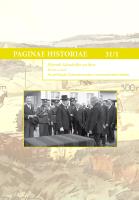Cesta od dodatkových úmluv k bezesmluvnímu stavu a odvrácení celní války: Eskalace a normalizace obchodně-politických vztahů Československa a Rakouska 1926–1929
The Path from Additional Conventions to the Contractless State and Averting the Tariff War: The Escalation and Normalisation of Business-Political Relations between Czechoslovakia and Austria (1926–1929)
Author(s): Tomáš MoricSubject(s): History, Economic history, Interwar Period (1920 - 1939)
Published by: Národní archiv
Keywords: Czechoslovak-Austrian relations; trade relations; political-economic relations
Summary/Abstract: Based on archival sources, the study elucidates the development of business-political relations between Czechoslovakia and Austria during the second half of the 1920s. In connection with the stabilisation of Austrian economy and its foreign-political establishment in the Versailles System, the study traces the emancipation of Austrian business politics especially in the customs sphere was enhanced by the growing pressure of Vienna for a bilateral business-political agreement. The article answers the question whether Austria achieved its requirements through a desired dialogue or through a tariff war that could be elicited by the adoption of higher autonomous customs tariffs, or forcing a time limit on the Czechoslovak side under the threat of the contractless relationship in the customs tariff sphere. In this context, the author further highlights that Czechoslovak diplomacy responded to this qualitative shift in mutual business-political relations by postponement tactics and in spite of the consent of Edvard Beneš to begin new negotiations on the general regulation of the mutual business relations in March 1925, that did not take place until early 1927 after the termination of the additional conventions by Austria. It is worth noticing that Austria retained the customs tariff provisional measure even after the subject agreements were terminated in April 1927. Nonetheless, even the new negotiations did not lead to an agreement that would facilitate better economic cooperation and the new additional agreement of June 1927 weakened the Czechoslovak position on the Austrian market. The study concludes with the paternalist discourse of Prague during their negotiations with Vienna and a certain dissonance primarily in the activities of the agrarian elites which asserted prohibitive agrarian tariffs despite their concern about the high Austrian autonomous customs tariffs.
Journal: Paginae Historiae
- Issue Year: 31/2023
- Issue No: 1
- Page Range: 325-340
- Page Count: 16
- Language: Czech

